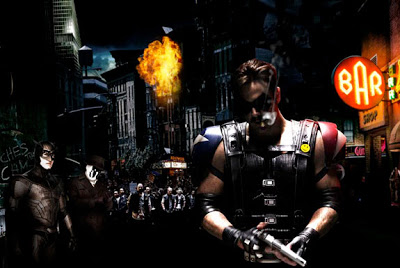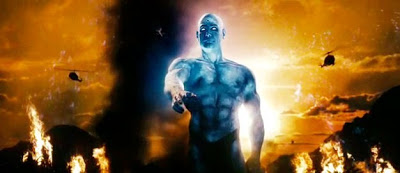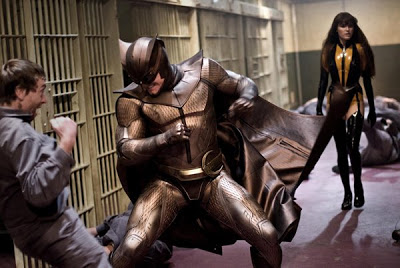I like big movies. I always have. Not being a professional film critic, I don’t feel obligated to prioritize small-scale, independent projects over studio-helmed blockbusters. I certainly have no intrinsic problem with low-key indie films – one of my favorite movies of 2008 was Rachel Getting Married, which is about as lo-fi and low-budget as you can get – but in general, my boyish, exuberant sensibilities tend to be partial to grand and even grandiose filmmaking. Cinema as a medium can show us truly remarkable things, and I love movies that tell sweeping stories on an epic scale, movies with an unapologetic sense of adventure and a bold imagination.
Zack Snyder’s Watchmen is, if nothing else, a big movie. With a $130 million budget, an IMAX release, an immensely popular novel that has inspired a rabid fan base, and a storyline of apocalyptic proportions (not to mention a runtime of two and a half hours), Watchmen demands to be recognized as an epic. In this, I suppose it succeeds – after all, making an epic is really all about effort, and no one is going to accuse Snyder of not trying hard enough.
More significantly, Watchmen is undeniably modern. Whereas Peter Jackson’s Lord of the Rings movies functioned as beautifully crafted throwbacks to the epics of Cecil B. DeMille, masking their new-fangled techniques with guile and subterfuge, Snyder’s picture proudly proclaims itself as a new-age phenomenon. Perhaps the logical cresting point of a school of cinema that has become increasingly reliant on digital wizardry to achieve its goals, Watchmen makes no attempt to hide its technological flourishes but brazenly flaunts them, almost as though it knowingly embodies what modern movies have become. It is, unapologetically, a movie for its time – our time.
Which is why Watchmen strikes me as both an impressive achievement and a deeply troubling omen. It is impressive not only for its operatic scope but its fluid, often delicate filmmaking. There are moments of breathtaking beauty, certainly, but what is more astonishing is how gracefully the movie flows. It’s not that the integration is seamless – in fact, Snyder’s implementation of digital effects is overwhelmingly obvious – but it is performed with such dexterity that I was in no way put off by the overt manipulation of the film’s images. Instead, I found myself seduced by Watchmen’s bold visual schema, eagerly absorbing each wonder as it appeared before me.
The troubling part is that as a narrative, Watchmen the motion picture is – and I take no joy in writing this – completely meaningless. There is simply no point to it. It moves lithely from one extraordinary sequence to the next, impressing us again and again with its visual splendor and bravura execution, yet on the fundamental level of its story, it is hopelessly inert. Rarely has a film that featured such craftsmanship been so utterly devoid of purpose.
Oh sure, there’s a plot, even a complicated one. Watchmen takes its cautionary tale of nuclear annihilation very seriously, which sadly makes it all the more laughable. I suppose it’s difficult to blame screenwriters David Hayter and Alex Tse for the picture’s storyline, as their adaptation of the novel (which I haven’t read) is allegedly faithful to the point of being slavish. But whether a result of this rigid screenwriting approach or a mere byproduct of the novel’s grandstanding, the film’s attempts at topical relevance fall painfully flat. Watchmen’s parallel universe features a number of potentially interesting, playful ideas – Nixon was elected five times! The U.S. won in Vietnam! Bob Dylan’s appeal is universal, no matter the universe! – but their execution is so half-hearted that they feel as though they were dreamed up by teenagers during their lunch hour. (It doesn’t help that the movie is by and large humorless.)
The real problem, though, is the chasmic distance between Watchmen’s characters and its audience, and it’s here where I blame director Zack Snyder. The concept of a band of formerly invincible, now-defunct superheroes is legitimately intriguing (and was realized with superior effect in Brad Bird’s The Incredibles), but Snyder just doesn’t seem to care. He’s far more invested in creating mythic images and visually compelling fight sequences than in shaping his protagonists with any depth. The result is a movie of sublime beauty that completely fails to engage at the most fundamental level.
The character in Watchmen that best symbolizes this critical flaw is Dr. Manhattan, undoubtedly the film’s signature persona. There are all-powerful superheroes, and then there’s Manhattan, a gigantic, ethereal blue-skinned figure who can teleport himself and other objects at will, replicate his own DNA, and perform other extraordinary feats of cosmic prowess (he single-handedly won the Vietnam War for the U.S. in a week). As a visual effect, Manhattan is a triumph of computer-generated artistry. His presence on screen is somehow both corporeal and absent – he interacts with his physical environment, yet he also seems beyond it, outside of it. Watching him, we acknowledge he is a digital creation, yet we never question his authenticity. He’s just there, and fantastically so.
Yet while Manhattan may serve as a superlative visual achievement, as a character he is a supreme bore. It’s difficult to develop much sympathy for an omnipotent being who says things like, “In my opinion, the existence of life is a highly overrated phenomenon,” and vanishes to Mars when he gets frustrated. I suppose diehard loyalists would argue that Manhattan – who is portrayed, to the extent that a computer-generated character can be portrayed, with near-obscene detachment by Billy Crudup – is locked in a bitter existential struggle, whereby his powers are so great that he is unable to relate with those he once loved. That might have been rewarding, if only he were able to relate to his audience. As is, whenever Manhattan was on-screen (which, unfortunately, comprised a significant amount of time), I found myself far more interested in how he looked than in what he was saying or feeling.
Not that the other characters are much more interesting. Jeffrey Dean Morgan’s Comedian is a parody of a war-crazed lunatic, Patrick Wilson’s Nite Owl II seems simply dismayed the entire time, and Matthew Goode’s Ozymandias is somnambulant. Unsurprisingly, both primary female heroes – a mother-daughter tandem played by Carla Gugino and Malin Akerman – lack substance. (Lest we forget, Snyder also directed the testosterone-laced, idiotic 300.) Oddly enough, the most intriguing character in Watchmen is Jackie Earle Haley’s Rorschach, an evident psychopath who nevertheless occasionally flirts with true emotion, although his vitriolic voiceovers seem to serve as a cipher to the screenwriters rather than to provide any insight into his own besieged mental state.
The scary part, though, is to recognize – in spite of its utter failings on the principal planes of plot and character – just how watchable Watchmen is. Snyder may not be much of a humanist, but he gets entertainment, and his movie is resplendent with both beautifully elegant moments and awesomely ass-kicking action sequences. The opening titles montage – a sort of who’s-who superhero retrospective set to Dylan’s “The Times They Are A-Changin’” – is grandiose to the extreme but magnificent anyway, as is the happily ridiculous homage to Apocalypse Now, with Dr. Manhattan casually storming the beaches of Vietnam to the tune of Wagner’s “Ride of the Valkyries”.
Watchmen is also very, very bloody, and Snyder’s adherence to extreme violence – parts of the movie are so grotesque that my friend Kerry was nearly reduced to plaintive whimpering on multiple occasions – is disturbing but also oddly refreshing. The blood that gushes throughout the film’s latter half may be excessive, but it’s somehow comforting that there’s a mainstream director out there who refuses to kowtow to the tyranny of the MPAA.
Snyder also proves deft at crafting taut, engaging action scenes. In a cinematic era dominated by camera-shaking and ultra-fast cutting, he maintains poised control throughout, supplying viewers with a sharp perspective and clean sight lines. He may be a bit enamored with slow-motion, but it’s nevertheless energizing to watch a fight scene without having to struggle to determine who’s attacking whom. Despite his hyper-stylized sensibilities, Snyder clearly places a premium not just on gimmickry but on visual coherence.
If only narrative coherence were of equal priority. What truly worries me is not that Snyder has failed in his efforts to imbue his characters with three-dimensionality but that he made no such efforts at all. Can a director so clearly prioritize visual artistry over storytelling elements and still create a compelling motion picture? It seems to be the case, and given the unmistakably contemporaneous nature of Watchmen, won’t other eager modern directors apply similar tactics to their attempts at epic in the not-too-distant future?
Such is my concern, as well as my primary takeaway from Snyder’s gargantuan effort. I’m thus left with the satisfaction of experiencing Watchmen as a visual triumph, and the fear that I’ll be experiencing other movies like it all too soon.
Jeremy Beck is the editor-in-chief of MovieManifesto. He watches more movies and television than he probably should.





I liked it.